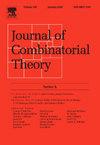Studying the divisibility of power LCM matrices by power GCD matrices on gcd-closed sets
IF 1.2
2区 数学
Q2 MATHEMATICS
引用次数: 0
Abstract
Let be a gcd-closed set (i.e. for all ). In 2002, Hong proposed the divisibility problem of characterizing all gcd-closed sets S with such that the GCD matrix (S) divides the LCM matrix in the ring . For , let . In 2009, Feng, Hong and Zhao answered this problem in the context where . In 2022, Zhao, Chen and Hong obtained a necessary and sufficient condition on the gcd-closed set S with such that . Meanwhile, they raised a conjecture on the necessary and sufficient condition such that holds for the remaining case . In this paper, we confirm the Zhao-Chen-Hong conjecture from a novel perspective, consequently solve Hong's open problem completely.
研究了幂LCM矩阵在GCD闭集上被幂GCD矩阵可整除的问题
设S={x1,…,xn}是一个gcd闭集(即(xi,xj)∈S,对于所有1≤i,j≤n)。2002年,Hong提出了表征所有GCD -闭集S的|S|≥4使得GCD矩阵(S)能除环Mn(Z)中的LCM矩阵[S]的可分性问题。x∈年代,让GS (x): = {z∈年代:z< x, z | x和y z | | x, y∈(S)⇒y∈{z、x}}。2009年,Feng, Hong和Zhao在maxx∈S∈{|GS(x)|}≤2的情况下回答了这个问题。Zhao、Chen和Hong在2022年得到了maxx∈S∈S (|GS(x)|}=3的gcd-闭集S上的一个充要条件,使得(S)|[S]。同时,他们提出了一个关于(S)|[S]对剩余情况maxx∈S∈{|GS(x)|}≥4成立的充分必要条件的猜想。本文从一个全新的角度证实了赵-陈-洪猜想,从而彻底解决了洪的开放问题。
本文章由计算机程序翻译,如有差异,请以英文原文为准。
求助全文
约1分钟内获得全文
求助全文
来源期刊
CiteScore
2.90
自引率
9.10%
发文量
94
审稿时长
12 months
期刊介绍:
The Journal of Combinatorial Theory publishes original mathematical research concerned with theoretical and physical aspects of the study of finite and discrete structures in all branches of science. Series A is concerned primarily with structures, designs, and applications of combinatorics and is a valuable tool for mathematicians and computer scientists.

 求助内容:
求助内容: 应助结果提醒方式:
应助结果提醒方式:


